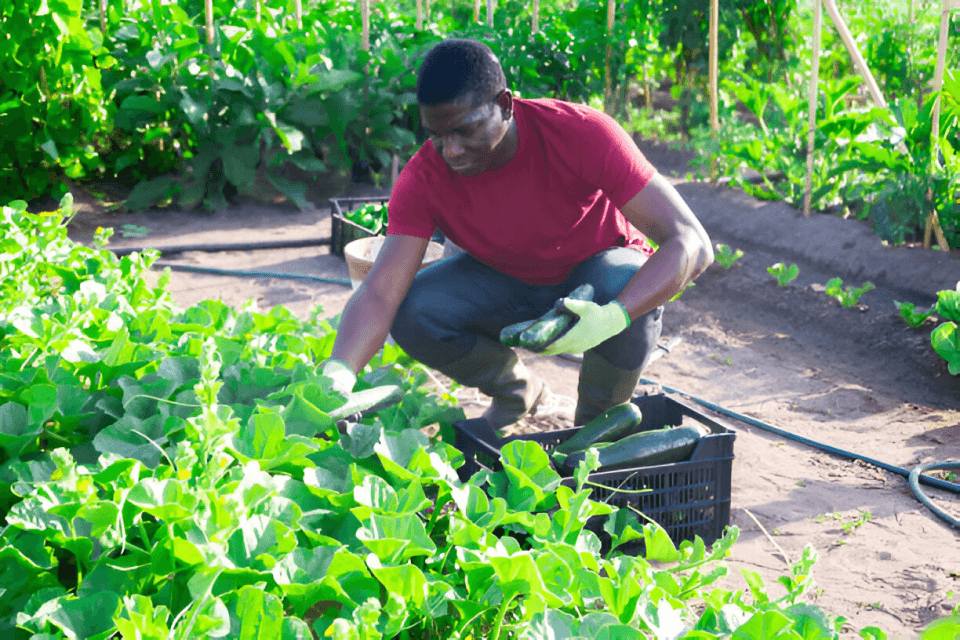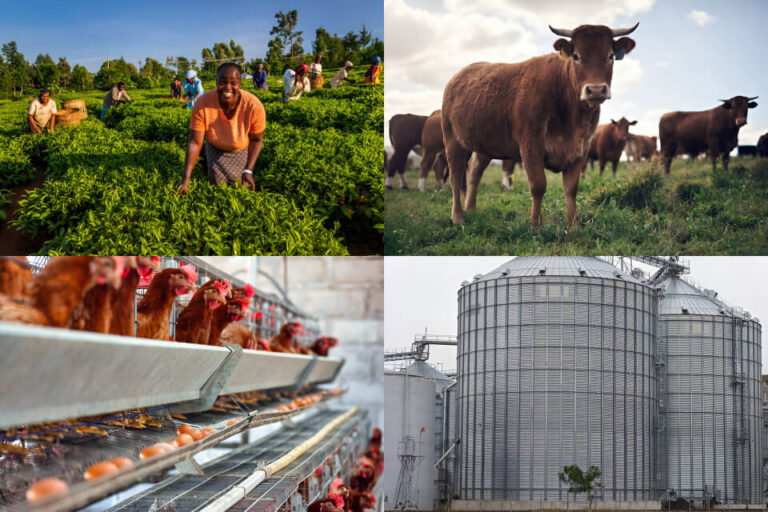Introduction
Are you an African agripreneur seeking to grow your business but struggling to access the funding you need? Agriculture is the backbone of many African economies, and unlocking the right funding opportunities is crucial for scaling operations and driving sustainable growth. Discover the best funding opportunities for African agripreneurs today!
Various finance sources, including private investors and government incentives. If you are confused about where to look, this article will walk you through several funding sources to help you take your agribusiness to the next level.
Introduction to Agripreneurship in Africa
Agriculture is a major contributor to Africa’s economy, providing employment, ensuring food security, and boosting GDP. With over 60% of the population employed in agriculture, the sector serves as a cornerstone for economic growth and poverty alleviation. Agripreneurship, the entrepreneurial side of agriculture, offers opportunities for innovation, improved productivity, and sustainability across the continent.
However, the role of agripreneurship in Africa’s food security is often challenged by limited access to finance, inadequate infrastructure, and lack of technology. Many agripreneurs struggle to secure the funding opportunities needed to expand their businesses and contribute to food security. Other obstacles include outdated farming equipment, poor road networks, and unreliable power supplies. Additionally, the lack of financial literacy and support systems hinders agripreneurs from effectively navigating the agricultural value chain, further impacting their ability to address food security challenges in Africa.
Despite these challenges, there are emerging opportunities. Agripreneurs who adopt technologies like mobile platforms and smart farming tools can overcome many of these hurdles. Increasing access to funding opportunities for agripreneurs is key to unlocking the full potential of Africa’s agriculture sector.
Categories of Funding Sources
- Public Sector Funding for African agripreneurs includes government grants, subsidies, and development programs. Many African governments are expanding financial support to enhance agricultural productivity and innovation, helping small farmers and startups access essential resources.
- Private Sector Investment, including venture capital, private equity, and corporate partnerships, is another vital funding source for agripreneurs. Investors are attracted to agriculture because of its growth potential, especially in areas like agri-tech and sustainable farming.
- Alternative and Innovative Financing: Crowdfunding websites, microfinance, and impact investing are examples of alternative financing techniques that are becoming more and more common. These funding sources provide flexible capital, particularly for agripreneurs in rural areas, offering non-traditional and accessible financial solutions.
Government Grants and Subsidies for Agripreneurs
Introduction to Government Support
Governments in Africa are key to supporting the agriculture sector, which continues to be the primary driver of economic growth and food security. They are designed to help agribusinesses flourish through generous funding opportunities such as grants and subsidies. This decreases the risk for farmers and agripreneurs, motivating them to invest in technology, tools, and increased farming methods.
Grants and subsidies form a critical pillar as this kind of financial support provides the backing needed to overcome high startup costs, lack of technological equipment, or unpredictable market prices. This, in turn, reduces poverty and hunger while promoting sustainable agribusiness development and improving food production across the continent.
Notable Government Grants in Africa
To encourage agripreneurship, several African governments have set aside funds in specific grant programs.
For instance, small-scale farmers in Nigeria receive credit through programs like the Anchor Borrowers Program. In Kenya, the Youth Enterprise Development Fund supports young farmers, aiming to increase youth participation in agriculture. South Africa’s Comprehensive Agricultural Support Programme (CASP) offers financial assistance to farmers for infrastructure development and capacity building.
Each of these programs has specific eligibility requirements. Generally, applicants must present a detailed business plan, demonstrate a commitment to farming, and, in some cases, join a cooperative. Agripreneurs should study each grants criterias and ensure they follow them. Understanding and adhering to these conditions increase the likelihood of receiving government funding.
Subsidies for Agripreneurs
Subsidies are another form of government support aimed at reducing financial constraints on agripreneurs. There are many types of subsidies available to farmers, including input subsidies (such as seeds, fertilizers, and pesticides) and equipment subsidies (such as tractors and irrigation systems).
Due to the fact that subsidies reduce production costs, farmers are able to invest more in improving their productivity as a result of subsidies. It is possible that subsidies can have a significant impact on the growth of an agribusiness, enabling farmers to expand their operations, adopt better technologies, and increase yields, resulting in higher profits and improved food security for all.
Steps to Apply for Government Grants and Subsidies
To tap into the financing opportunities around them, agripreneurs should start by researching available grant and subsidy programs in their country. Detailed information is often available on government websites, through agricultural ministries, or local cooperatives.
After identifying a program, applicants should review the application guidelines carefully, ensuring they provide a thorough business plan and complete documentation. Meeting deadlines and considering cooperative membership can also boost approval chances.
In summary, government grants and subsidies are crucial for supporting African agripreneurs. These financial supports provide essential resources for scaling agribusinesses, improving efficiency, and increasing profitability. By understanding available programs and navigating the application process, agripreneurs can access funding sources that drive growth and sustainability in Africa’s agriculture sector.

How to Access Private Investment and Venture Capital
Private investment and venture capital are vital for African agripreneurs looking for funding. Such funding enables them to scale agribusiness, innovate, and maneuver challenges in the agricultural space.
- Private Equity and Venture Capital
The significance of private investments, notably private equity and venture capital, in scaling up the dynamics of agro industries, can not be over emphasized. Similarly, private equity funds mature agribusinesses, while venture capital invests in scalable startups. Venture capital is the solution to African agribusiness (for improved food security, sustainability, and rural livelihoods).
Private investments in agribusiness are the funds provided by individuals or businesses for their commercial interests, which could help in expanding, investing some creativity, and increasing growth. Such investments are essential to enable agribusinesses to not only grow in scale and efficiency; they more critically support the development of new technology and foster environmentally sustainable value chains. In innovating for the agricultural sector of Africa, venture capital is a subsect growing fast, opening doors to those willing and able to invest in the potential of African agribusiness.
Key Venture Capital Firms and Investment Funds
Investors Flocking To Agribusiness In Africa:
- AgDevCo: A social impact investor that focuses on agribusiness in sub-Saharan Africa. It assists small and medium-sized businesses (SMEs) involved in farming, agribusiness, and logistics to give African farmers possibilities for employment and revenue development.
- Omnivore Partners: An early-stage venture fund investing in agritech. This venture capital funds entrepreneurs building the future of agriculture and food systems.
Capital from investors are listed to assist agribusinesses in scaling, innovating, and addressing food security issues. The appeal of regional and sector-specific funds is also on the rise as they allow investors to build up confidence in investing by focusing their money on agro-sectors like livestock, dairy, and crops.
How to Attract Private Investors
In attracting private investors, the first question is “how do I create an irresistible business plan and pitch?”
Attracting private investors begins with crafting an irresistible business plan and pitch. The key to a winning pitch is clearly articulating your business model, demonstrating its scalability, and outlining how the company generates revenue. Investors seek agribusinesses that can scale, access new markets, and offer innovative solutions to pressing agricultural challenges.
Highlighting a strong team with deep agricultural expertise, along with a well-thought-out go-to-market strategy, will further pique investor interest.
In addition, addressing the potential impact on critical issues like food security or sustainability can create a compelling narrative that resonates with investors seeking both financial returns and social impact.
Partnerships and Networks
Partnerships and networks are crucial for agripreneurs seeking greater funding opportunities. Incubators and accelerators play a significant role in connecting these entrepreneurs with investors through mentorship, networking, and business development support. Agriculture-specific incubators like Nourishing Africa and Green Innovation Centers focus on nurturing young entrepreneurs in the agricultural sector across Africa.
These hubs not only sieve and promote innovative business ideas but also facilitate the building of investor networks. By providing resources and connections, they empower agripreneurs to enhance their business models and attract the necessary funding to scale their operations, driving economic growth within the agricultural ecosystem.

Crowdfunding and Alternative Funding Options
- Overview of Crowdfunding
In addition to raising capital, crowdfunding has become quite popular among African agripreneurs, especially those seeking a variety of funding options; crowdfunding helps individuals raise cash by taking small contributions from a large number of people, usually done online.
Crowdfunding takes many forms, with reward-based crowdfunding offering backers a product or service in exchange for their support, and equity-based incentivizing contributors by providing shares of the company. Also, there is debt-based crowdfunding, in which funds are given by pledges to be repaid over time (or not at all), and donation-based, where contributors expect no financial return on their investment.
Crowdfunding services are available to help many agripreneurs in Africa raise capital for equipment, seeds, or even expanding their operations. These entrepreneurs understand that by introducing their project and demonstrating its social force, they can communicate with backers who care about agriculture, sustainability, and community development. Crowdfunding offers agripreneurs an opportunity to present their innovative farming solutions to the world and meet with like-minded supporters.
Successful Crowdfunding Platforms for African Agripreneurs
There are a number of platforms that provide crowdfunding for African agripreneurs, giving them access to capital from both local and global sources.
Examples of Platforms:
- Thundafund: A platform from South Africa for creative and agricultural projects.
- M-Changa: A Kenyan mobile fundraising platform that enables entrepreneurs to connect with contributors.
- Kiva: A global lending platform that enables small business owners, like African agripreneurs, to access interest-free loans from a worldwide community of lenders.
Alternative Funding Options
African agripreneurs have more options than just crowdfunding. Several alternative sources provide access to funding and support community development. Here’s a list of some of them.
- Peer-to-Peer Lending: P2P lending connects agripreneurs directly with investors willing to lend money at competitive rates. P2P lending platforms provide instant liquidity without the need for bank intervention.
- Impact Investing & Social Enterprises: Another way to secure funding is impact investing, where investors seek ventures that deliver both financial and social or environmental benefits. Agripreneurs focusing on sustainability can attract these investors by showcasing their contributions to society and the environment.
- Microfinance Institutions and Community-Based Financing: Agripreneurs who may not qualify for conventional bank loans can obtain small loans from microfinance institutions. Community-based financing, such as cooperative lending and village savings groups, helps pool resources so that agripreneurs can invest in their operations.
How to Structure a Crowdfunding Campaign
Structuring your crowdfunding campaign correctly is essential for attracting backers and meeting funding targets. Here’s how to go about it:
- Setting Funding Goals and Milestones: Agripreneurs should set clear, achievable funding targets and break them down into appropriate increments. This helps investors understand how their money will be used and works as a progress report for the project.
- Engaging with Potential Backers: Campaigns should actively engage with their backers. Agripreneurs need to share their agricultural story, passion, and provide regular updates to keep backers involved in their journey.
Marketing and Leveraging Social Media: Using social media to raise awareness is crucial for a crowdfunding campaign. Agripreneurs should publish their campaign on various platforms, using pictures, videos, and testimonials to build a network and gain support.

Challenges and Best Practices in Accessing Funding
For many agripreneurs in Africa, accessing financing for their businesses can sometimes be very challenging. Although some support comes from funding opportunities for African agripreneurs, barriers such as regulatory challenges and a lack of information hinder their access to finance. However, by following best practices and staying updated on the latest trends in farming loans, agripreneurs can improve their chances of securing funding.
Common Barriers for Agripreneurs
- Regulatory Challenges: Agripreneurs face many regulatory bottlenecks that can vary across African countries. Bureaucracy, unclear policies, and permit delays can all slow down access to credit.
- Lack of Awareness and Access to Information: A significant hurdle is the lack of awareness about available funding opportunities for African agripreneurs, even though many have well-prepared business plans. Many people are unaware that they could apply for grants or loans and create more financial programs for their agricultural businesses.
- High Interest Rates and Unfavorable Loan Terms: Traditional banks and financial institutions often offer loans with high interest rates and unfavorable repayment terms. For many agripreneurs, especially resource-poor and small-scale farmers, these terms make borrowing almost unaffordable, preventing them from scaling their operations.
Best Practices for Securing Funding
- Building a strong credit history and track record: Having a good credit history and experience in farming or agribusiness is crucial for accessing funds. Lenders are more likely to trust agripreneurs who have proven themselves as reliable and financially stable.
- Diversifying Funding Sources: Agripreneurs should explore various funding options, including grants, venture capital, and crowdfunding platforms. Diversifying sources increases the chances of securing necessary capital while reducing reliance on any one lender.
- Networking and Joining Agripreneur Associations and Industry Events: Networking with other agripreneurs and attending industry events can open doors to funding opportunities. Joining associations provides access to shared resources, information on grants, and mentorship.
Future Trends in Agricultural Financing
- Digital Innovations in Financing: The rise of digital solutions, such as mobile money and blockchain technology, is transforming how agripreneurs access funding. These innovations allow farmers to receive loans and payments directly to their mobile devices, increasing financial inclusion.
- Rise of Sustainable and Climate-Smart Agribusiness Funding: There is growing interest in funding agribusinesses that adopt sustainable and climate-smart practices. Investors and lenders are increasingly supporting ventures that promote environmental sustainability and resilience to climate change.
Frequently Asked Questions (FAQs)
1. Are there agripreneur loan opportunities in Africa?
Yes, most banks and microfinance institutions provide agricultural loans to both small and large agribusinesses.
2. What government funding programs support agripreneurs?
Many African governments have introduced agriculture support funds, subsidies, and grants.
3. Are there international funding programs for African agripreneurs?
International agencies such as USAID and FAO certainly finance projects that promote sustainable agriculture in Africa.
4. Can agripreneurs crowdfund for their projects?
Crowdfunding is fast becoming an option, as agripreneurs can now directly collect money from the public.
5. How can agripreneurs qualify for funding?
Agripreneurs must have a business plan, financials in place, and be able to show that they can make an impact.
Conclusion
Funding opportunities for African agripreneurs continue to grow, with options such as grants, loans, and venture capital, and government programs. These resources can be used to drive innovation, enhance productivity, and scale their agribusinesses. As agriculture remains central to Africa’s economic growth, funding support is crucial in transforming the sector.
However, challenges such as accessing finance and meeting eligibility criteria persist. With the right support and continued development of funding platforms, African agripreneurs can play a key role in addressing food security and boosting local economies. The future holds great potential for those willing to explore these funding opportunities.




1 thought on “Funding Opportunities for African Agripreneurs”
you’re really a excellent webmaster. The website loading speed is incredible. It kind of feels that you’re doing any distinctive trick. Also, The contents are masterwork. you have performed a wonderful job in this subject!